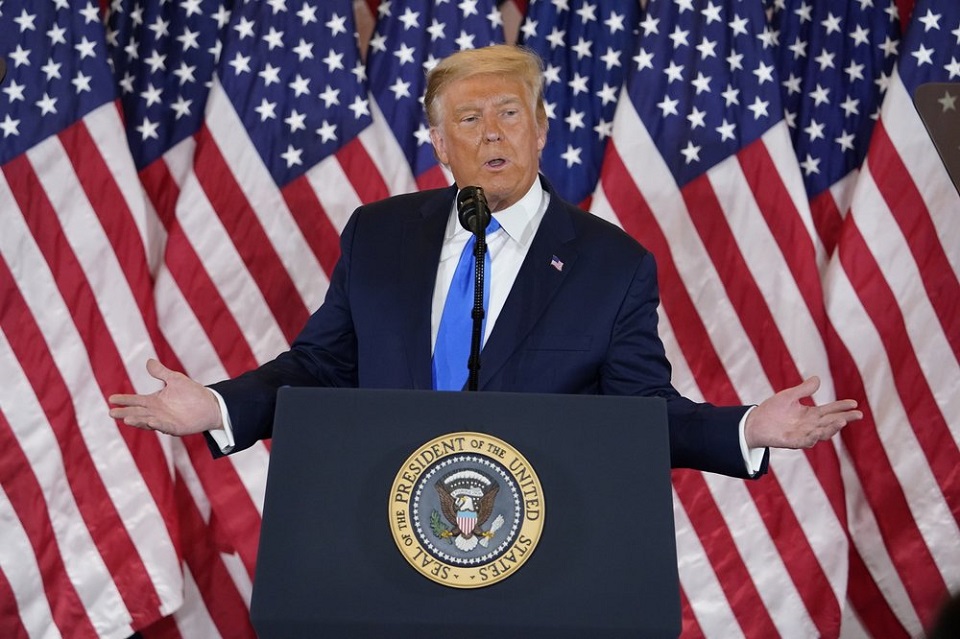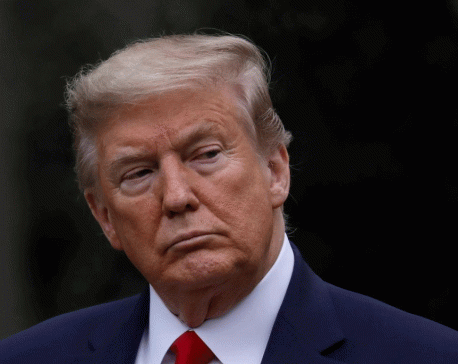
OR
Trump faces setbacks in other probes as NY case proceeds
Published On: April 3, 2023 11:45 AM NPT By: Associated Press

WASHINGTON, April 3: Former President Donald Trump faces the most urgent legal challenge of his life this week in New York, where he’s set to be arraigned Tuesday on charges arising from hush money payments during his 2016 campaign.
But as much of the attention will be on the courthouse in lower Manhattan, investigations from Atlanta to Washington will press forward, underscoring the broad range of peril he confronts as he seeks to reclaim the presidency.
The vulnerability Trump faces in Washington alone has become clear over the past month, as judges in a succession of sealed rulings have turned aside the Trump team’s efforts to block grand jury testimony — including from his own lawyer and his former vice president — from witnesses who were, or still are, close to him and who could conceivably offer direct insight into key events.
The rulings directing advisers and aides to testify don’t suggest that the Justice Department is close to bringing criminal charges, nor do they guarantee that prosecutors can secure testimony valuable to a potential prosecution. But they’re nonetheless a key, closed-door win for the government as it investigates whether classified documents were criminally mishandled at Trump’s Florida home and the possible obstruction of that probe, as well as efforts by Trump and his allies to undo the results of the 2020 presidential election.
“I do think when you’re talking about an attempted insurrection and the kinds of issues that we’re talking about there, there’s going to be a lot of arguments on DOJ’s side” to get the testimony, said Randall Eliason, a former federal prosecutor and a George Washington University law professor.
Meanwhile, the district attorney in Atlanta is continuing to investigate attempts by Trump and his allies to undo his election loss in Georgia. A special grand jury in February said it believed “one or more witnesses” committed perjury and urged local prosecutors to bring charges.
The former president never testified before the special grand jury, meaning he is not among those who could have perjured themselves. But the report doesn’t foreclose the possibility of other charges, and the case still poses particular challenges for Trump, in part because his actions in Georgia were so public.
Overall, the number of sealed disputes over the scope of grand jury testimony is unusual but perhaps befitting for hugely consequential probes like one concerning a former president. It also stands in contrast to the last special counsel investigation involving Trump, when he was president and when Robert Mueller and his team of prosecutors sought to determine whether Trump’s 2016 campaign had colluded with Russia to tip the election.
In that probe, a lawyer inside the White House, Ty Cobb, facilitated voluntary interviews of White House staff — without subpoenas — in hopes that cooperation would hasten the investigation toward conclusion.
“If I could figure out a way to cooperate and still preserve executive privilege, it would speed things up, which in my judgment ... was imperative to the president and to the country,” Cobb said in a recent interview. “We were able to accelerate getting them all of the information.”
Trump in that investigation was protected by the power of his office and by Justice Department legal opinions that say a sitting president cannot be indicted. No longer president, Trump has lost that shield, raising the stakes of his criminal exposure. And as prosecutors have sought to question people close to him — whether to better understand Trump’s state of mind and possible defenses, or to gather potentially damaging testimony — Trump’s lawyers have repeatedly objected, often in vain.
Perhaps the most vivid example came last month when the then-chief judge of the D.C. federal court ordered that Trump’s lawyer, M. Evan Corcoran, had to give more grand jury testimony in the Mar-a-Lago investigation. He had invoked attorney-client privilege in an earlier appearance before the grand jury in declining to answer more questions, but prosecutors pressed for more testimony.
They cited what’s known as the crime-fraud exception to attorney client privilege, which allows prosecutors to compel testimony from a lawyer if they can convince a judge that a client was using legal services in furtherance of a crime. U.S. District Judge Beryl Howell ruled that Corcoran had to return before the grand jury, and he was in court a week later.
Another instance came last week when a different federal judge, James Boasberg, ruled that former Vice President Mike Pence had to give some testimony in a Justice Department special counsel probe into efforts to undo the election.
The decision rejected the Trump team’s arguments of executive privilege, though Boasberg did give Pence a victory by accepting his lawyers’ arguments that, for constitutional reasons, he could not be questioned about his actions on Jan. 6, 2021, when a mob of Trump’s supporters stormed the U.S. Capitol as Republican Pence was presiding over a joint session of Congress to certify Democrat Joe Biden’s victory.
A Trump spokesman did not respond to a request for comment on this story but responded to the ruling in the Pence matter in a statement saying that the Justice Department “is continuously stepping far outside the standard norms in attempting to destroy the long accepted, long held, Constitutionally based standards of attorney-client privilege and executive privilege.”
Other former Trump aides, including Stephen Miller and former national security adviser Robert O’Brien, have also recently been ordered by a judge to offer testimony despite Trump team objections of executive privilege.
The ability of Justice Department prosecutors in multiple instances to convince judges that there’s a basis to secure the testimony is significant to the extent that it shows that “there’s a there there” with respect to the investigations, Eliason said.
But he cautioned from reading too much into it, given that the threshold for prevailing in a fight over executive privilege or attorney-client is lower than the burden needed to win a criminal case at trial.
“It’s a far cry from being able to prove guilt beyond a reasonable doubt in a contested trial,” Eliason said. “It would be quite a leap to go from there and be able to say that they’ve got a criminal case locked up.”
You May Like This

Donald Trump ordered to pay The New York Times and its reporters nearly $400,000 in legal fees
NEW YORK (AP) — Former President Donald Trump was ordered Friday to pay nearly $400,000 in legal fees to The... Read More...

Trump arrested? Putin jailed? Fake AI images spread online
NEW YORK, March 24: Former President Donald Trump getting gang-tackled by riot-gear-clad New York City police officers. Russian President Vladimir... Read More...

Trump's potential indictment caps decades of legal scrutiny
NEW YORK, March 22: For 40 years, former President Donald Trump has navigated countless legal investigations without ever facing criminal... Read More...




Just In
- Health ministry to conduct ‘search and vaccinate’ campaign on May 13
- Indian customs releases trucks carrying Nepali tea, halted across Kakarbhitta
- Silent period for by-election to begin from midnight
- SC issues short-term interim order to govt and TU not to take immediate action against TU legal advisor Khanal
- National consultation workshop advocates to scale up nutrition smart community in Nepal
- Patan High Court issues short-term interim order to halt selection process of NTB’s CEO
- NEPSE inches up 0.15 points; daily turnover increases to Rs 2.53 billion
- Bagmati Govt mandates tri-lingual signboards in offices














Leave A Comment